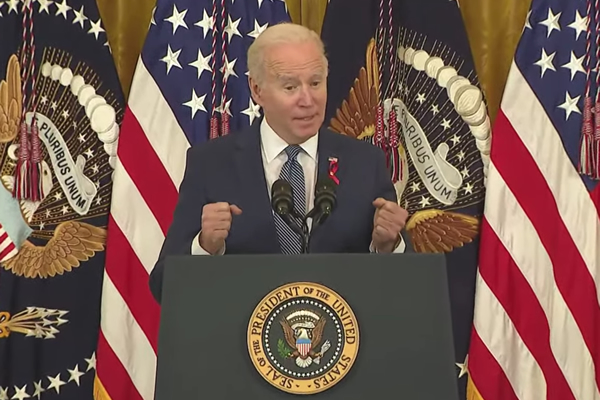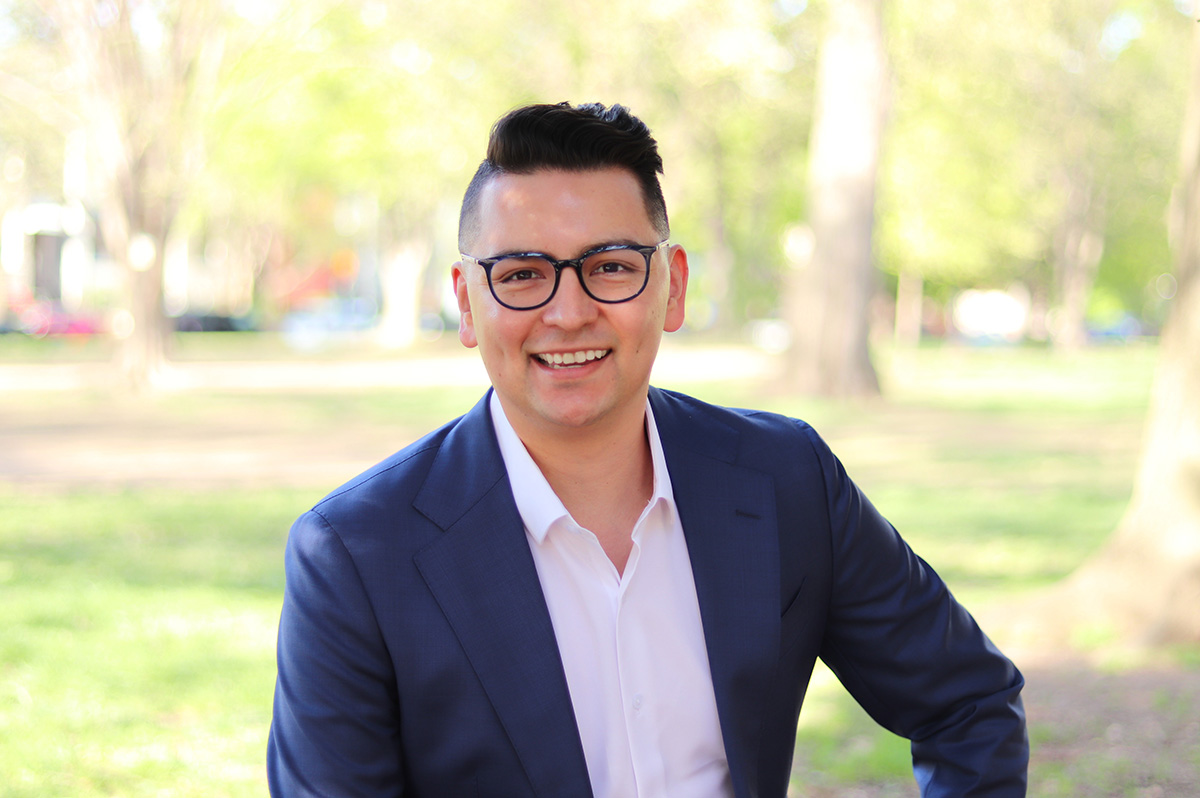News
Biden’s update to HIV strategy hailed for recognizing racism as health issue
New blueprint outlines plan from 2022 to 2025

A recent update to the National HIV Strategy by the Biden administration is getting good reviews from advocates in the fight against HIV/AIDS, who are praising the new blueprint for recognizing challenges in the epidemic and racism as a public health issue.
Carl Schmid, executive director of the HIV & Hepatitis Policy Institute and member of the President’s Advisory Council on HIV/AIDS, assessed the update as “very, very positive,” saying it built on components of a previous iteration of the strategy issued during the Trump administration and made new ones.
“I think the community is extremely pleased,” Schmid said. “There’s a new component…racism is a public health issue. So, all these positive — the disparities, which is just so big. Anytime you’re addressing HIV, you’re always addressing disparities.”
Schmid also said the updated blueprint — which articulates a plan from 2022 through 2025 and was issued last week to coincide with the first World AIDS Day during the Biden administration — makes outreach to the private sector.
“I think that’s good because it’s the people who influence society like technology companies, people who have high gay and bisexual employees, like [the] travel industry, get them all involved,” Schmid said. “So, and that, I think should help with the stigma.”
Schmid also hailed the strategy for its promotion of the Affordable Care Act as a tool to fight HIV/AIDS, which he said was absent in the iteration of the report under former President Trump.
President Biden, in remarks on World AIDS Day last week before advocates in the fight against HIV/AIDS in the East Room the White House, said the uptrend strategy is “a roadmap for how we’re going to put our foot on the gas and accelerate our efforts to end the HIV epidemic in the United States by the year 2030.”
“That’s the goal,” Biden added. “And it centers on the kind of innovative, community solutions — community-driven solutions that we know will work.”
Consistent with his administration’s stated commitment to racial equity and recognizing disparities among diverse groups, including LGBTQ people, Biden said the plan ensures “the latest advances in HIV prevention, diagnosis and treatment are available to everyone, regardless of their age, race, gender identity, sexual orientation, disability, or other factors.”
“Critically, this strategy takes on racial and gender disparities in our health system that for much too long have affected HIV outcomes in our country — to ensure that our national response is a truly equitable response,” Biden said.
The updated blueprint is the fourth iteration of the National HIV Strategy, which was first issued during the Obama administration, then updated during the Obama years and again during the Trump administration before the Biden administration unveiled the version last week.
The 93-page strategy makes recognition of racism as a public health issue a key component of the plan to fight HIV/AIDS, calling it a “serious public health threat that directly affects the well-being of millions of Americans.”
“Racism is not only the discrimination against one group based on the color of their skin or their race or ethnicity, but also the structural barriers that impact racial and ethnic groups differently to influence where a person lives, where they work, where they play, and where they gather as a community,” the strategy says. “Over generations, these structural inequities have resulted in racial and ethnic health disparities that are severe, far-reaching, and unacceptable.”
Data shows racial disparities remain a significant obstacle in thwarting the HIV/AIDS epidemic. According to the Centers for Disease Control & Prevention, new HIV infections in the United States declined by 8 percent between 2015 and 2019, with much of the progress due to larger declines among young gay and bisexual men in recent years.
But although HIV infections among young gay and bisexual men have dropped 33 percent overall, with declines in young men among all races, the CDC finds “African Americans and Hispanics/Latinos continue to be severely and disproportionately affected.”
A senior Biden administration official, speaking last week on background in a conference call with reporters to promote the HIV strategy, said in response to a question from the Washington Blade the recognition of racism “as a serious public health threat” was a key difference from previous iterations of the blueprint.
“There are several updates in this,” the official said. “And some of those new features or new areas of focus have come about from both community input as well as sitting down with our federal partners and thinking about also the priorities of this administration, where there is a focus on equity, there is a focus on addressing stigma and discrimination and ensuring that also marginalized populations have access to healthcare, and that we are also working to ensure that the voices of those with lived experience are part of our response.”
Jennifer Kates, director of global health & HIV policy for the Kaiser Family Foundation, said the recognition of social and racial disparities is a key component of the updated strategy.
“One area in which the updated strategy stakes out new and stronger ground is in its explicit focus on the social/structural determinants of health,” Kates said. “The strategy doesn’t just mention them but seeks to address them through a variety of objectives. This is a departure and an important one.”
Kates, however,.cautioned: “Of course, the devil will be in the details and there will always be a tension between what the federal government itself can do and the power that state and local jurisdictions actually have.”
One aspect of note during Biden’s remarks on World AIDS Day was his articulation of 2030 as the target date to beat HIV, with the goal of reducing new infection rates by 90 percent in that year. That 2030 goal was established by health officials during the Trump administration, but Biden had campaigned on 2025 — much to the skepticism of some observers.
The Department of Health & Human Services, in response an inquiry from the Blade on whether a decision was made to forgo 2025 and stick with 2030 as the target date, deferred comment to the White House, which didn’t immediately respond.
Schmid, who was among those during the election who expressed skepticism of the 2025 target date, said he spoke to the White House after an initial Blade report on the changed target date and was told the administration determined 2025 was “not feasible.”
“That was a campaign statement,” Schmid said. “I said then that it was not realistic, and I think others agreed with me particularly because of COVID, and we were during the campaign, but he said it and sometimes people say things during the campaign that they might not always live up to because it was unrealistic.”
Schmid, however, downplayed the importance of Biden articulating a different target date to beat HIV/AIDS compared to the one he promised during the presidential campaign, saying the initial date had demonstrated his “strong commitment” on the issue.
Now that the Biden administration has issued the new strategy, the work turns toward implementation, which would mean acting on the blueprint in conjunction with the Ending the HIV Epidemic initiative already underway.
Schmid said the next step in the process is making sure funding is robust, HIV testing continues despite the coronavirus pandemic — and working to make PrEP more accessible.
Key to the effort, Schmid said, would be new legislation introduced before Congress to set up a national PrEP program, one introduced by Rep. Bonnie Watson Coleman (D-N.J.), another by Rep. Adam Schiff (D-Calif.) and another by Sen. Tina Smith (D-Minn.). Those bills, Schmid said, would ensure the uninsured have access to PrEP and health plans cover them without cost.
“I’ve been focusing a lot on that,” Schmid said. “It would be great to get the administration’s support for these as well, and money in the budget to implement these national PrEP programs.”
India
Opposition from religious groups prompts Indian Pride group to cancel annual parade
Event was to have taken place in Amritsar on April 27

Pride Amritsar, a student-led organization in the Indian state of Punjab, earlier this month announced the cancellation of its Pride parade that was scheduled to take place on April 27, citing opposition from certain religious groups.
The event, planned for the Rose Garden in Amritsar, a city revered as a spiritual center of Sikhism, had faced mounting resistance from Sikh religious organizations, including the Nihang Singh faction and the Akal Takht, the faith’s highest temporal authority. These groups labeled the parade as “unnatural” and urged local authorities to deny permission, citing its potential to disrupt the city’s religious sanctity.
In an Instagram post on April 6, Pride Amritsar organizers Ridham Chadha and Ramit Seth elaborated on its mission and the reasons for the cancellation.
“Since 2019, we have organized peaceful parades and celebrations in Amritsar to connect and uplift the LGBTQIA+ community, with a particular focus on transgender individuals and their rights,” their statement read.
Chadha and Seth highlighted Pride Amritsar efforts in providing guidance, counseling, and job opportunities, which have been met with positive responses. However, due to opposition this year, Pride Amritsar announced the cancellation of the 2025 parade.
“We have no intention of harming the sentiments of any religious or political groups,” the statement read. “The safety of our members is our top priority, and we will take all necessary measures to ensure their protection.”
Chadha and Seth spoke with the Washington Blade about their decision to cancel the parade.
They explained that resistance came from both religious and political groups who labeled the parade and its values as anti-Sikh and contrary to Punjabi and Indian cultural norms. Critics specifically objected to the event’s location in Amritsar, a city regarded as a sacred center of Sikhism, arguing that the parade would disrupt its spiritual purity.
Chadha and Seth stressed Pride Amritsar lacks political, financial, or legal support. Composed of students and young professionals, the group organizes the parade biennially, dedicating personal time to advocate for the LGBTQ community.
“We do it independently, crowdfund the parade and cover the rest with our pockets,” said Seth and Chadha.
When asked by the Blade why Pride Amritsar did not approach the High Court or local authorities to protect the parade, despite the Supreme Court’s 2018 ruling that decriminalized consensual same-sex sexual relations, Chadha and Seth cited significant barriers.
“Pursuing legal action in India requires substantial resources, both financial and temporal,” they explained.
Chadha and Seth also noted that such action could lead to public shaming and unwanted publicity for participants, potentially harming their careers in Amritsar. They therefore chose not to pursue legal recourse.
Chadha and Seth said Pride Amritsar does not have any plans to hold alternative events.
“We are still exploring options, but we are likely not holding any events this year,” they said, citing significant harassment that organizers faced and the need for time to plan how to best serve the local LGBTQ community moving forward.
“Our evaluation of what the biggest challenge is has changed after this year,” said Chadha and Seth to the Washington Blade. “The biggest challenge, by far, seems to be education. We need to educate the community about what the community is, does, and why it exists. Why we do parades. Why we dance. Why calling someone ‘chakka’ is harmful. How we actually fit into religion and fall within the guidelines.”
Chadha and Seth said organizing the parade in Amritsar since 2019 has been an uplifting experience, despite continued opposition.
“The moment you join the parade, chant a slogan, or sing a song, it’s transformative,” they said. “Fear vanishes, and a sense of freedom takes over.”
The cancellation of the 2025 Amritsar Pride Parade has sparked concerns among activists in Punjab, as the Indian Express reported.
The Punjab LGBT Alliance and other groups expressed concern that the decision to cancel the parade may strengthen opposition to future LGBTQ-specific events.
District of Columbia
D.C. police seek help in identifying suspect in anti-gay threats case
Victim threatened with assault, called ‘faggot’ as he left Capitals game

D.C. police are seeking help from the public in identifying a male suspect whose image was captured by a video surveillance camera after he allegedly shouted anti-gay slurs and threatened to assault a man at 6th and H Streets, N.W. on March 20 at about 9:54 p.m.
A police report says the victim told police the incident took place shortly after he exited the nearby Capital One Arena where he had attended a Washington Capitals hockey game.
The police report says the incident began when the victim saw the suspect yell a racist slur at a person behind the victim and started to berate a valet operator.
“Suspect 1 then turned his attention to Victim 1 and called him a ‘faggot’ among other homophobic slurs,” the report says. It says the victim then used his phone to record the suspect, prompting the suspect to walk away before returning and “snatching” the phone from the victim’s hand.
“Suspect 1 walked several feet as Victim 1 followed, requesting his phone back,” the report continues. “Suspect 1 stopped and turned to Victim 1 and while yelling other obscenities exclaimed ‘if you keep recording, I’m going to kick your ass.’” The report concludes by saying the victim was able to recover his phone.
It lists the incident as a “Threats To Do Bodily Harm” offense that is a suspected hate crime.
“Anyone who can identify this suspect or has knowledge of this incident should take no action but call police at 202-727-9099, or text your tip to the Department’s TEXT TIP LINE at 50411,” according to a separate police statement released April 23.
The statement says police currently offer an award of up to $1,000 to anyone who can provide information that leads to an arrest and indictment of the person or persons responsible for a crime committed in D.C.
D.C. police spokesperson Tom Lynch said the case has been under investigation since the incident occurred on March 20. He said the video image of the suspect, most likely obtained from a security camera from a nearby business, was released to the public as soon as it was obtained and processed through the investigation.
District of Columbia
Wanda Alston Foundation names new executive director
Longtime LGBTQ rights advocate Cesar Toledo to succeed June Crenshaw

The Wanda Alston Foundation, the D.C.-based organization that has provided housing and support services for homeless LGBTQ youth since its founding in 2008, announced it has appointed longtime LGBTQ rights advocate Cesar Toledo as its new executive director.
In an April 22 statement, the organization said that as part of a planned leadership transition launched in November 2024, Toledo will succeed June Crenshaw, who Alston Foundation officials and LGBTQ community activists say has led the organization with distinction in her role as executive director for the past nine years.
In a statement released last November, the foundation announced Crenshaw was stepping down from her role as executive director after deciding to “to step into her next chapter.”
“June’s leadership has been truly transformative,” said Alston Foundation Board Chair Darrin Glymph in the group’s April 22 statement. “We are immensely grateful for her dedication and equally excited for the energy and experience that Cesar brings to lead us into this next chapter,” Glymph said.
“A seasoned LGBTQ+ advocate, Cesar brings over a decade of experience leading national campaigns, shaping public policy, and building inclusive communities,” the statement released by the group says. “Most recently, he served as the National LGBTQ+ Engagement Director for the Harris for President Campaign and has built a career focused on advancing equality and equitable education,” it says.
Biographical information about Toledo shows that immediately prior to working for the Harris For President Campaign, he served since April 2023 as deputy director for Democrats for Education Reform DC (DFER DC), a political group that helps to elect candidates for public office committed to quality education for all students, including minorities, people of color and LGBTQ youth.
Before joining DFER DC, Toledo served as political director for the LGBTQ+ Victory Fund, where he assisted in electing out LGBTQ candidates to all levels of public office across the U.S.
“I’m really excited about joining the Wanda Alston Foundation,” Toledo told the Washington Blade. “After a decade of working at the intersection of politics and policy and advancing political candidates and equitable education here in D.C., I wanted to shift my career to direct services to the most vulnerable folks in the LGBTQ+ family and our homeless youth,” he said.
Among other things, he said he would push for increasing the Alston Foundation’s visibility and mainlining its services for LGBTQ youth at a time when the national political climate has become less supportive.
A statement on its website says the Alston Foundation was founded in 2008 “in memory of Wanda Alston, a fierce LGBTQ+ activist, national advocate, and government official who was admired by District residents.”
The statement adds, “The foundation opened the first housing program in the nation’s capital in 2008 providing pre-independent transitional living and life-saving support services to LGBTQ+ youth.”
In a separate statement, the Alston Foundation announced it would hold a “thank you” celebration of appreciation for June Crenshaw from 6-8 p.m. on May 20 at Crush Dance Bar located at 2007 14th Street, N.W. in D.C.
“Let’s come together to celebrate her dedication and commitment for everything she has done for the LGBTQIA homeless youth population,” the statement says.




















